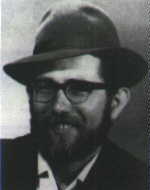Son of Ya’akov-Aryeh and Mindel. He was born on November 23, 1941 in Alba-Yulia, Romania, where he immigrated to Israel in 1947. He studied at the Yavneh Elementary School until the fifth grade and in the sixth grade He studied in the educational institutions of Yeshivat Ponevezh, both in the small Yeshivah and in the large Yeshivah, and he was very outstanding in his studies, and he enjoyed the grace and kindness of his teachers, who prophesied a great future for him. Came to the aid of his father, who struggled with the need to make a living in his hard work, and said to stand by him and help him, but before that he knew that he had to fulfill his national duty and serve in the army. When he was 18, but his father spoke to him and told him that maybe he should learn another year or two and then go to the army. Even his rabbis at the Ponevezh Yeshiva pressured him to postpone his enlistment and continue to study, but Yitzhak refused all. He decided to enlist in time and join the Nahal, and since he was a member of the Agudat Israel party, he joined the “Horev” Nahal youth group of the ultra-Orthodox youth organization Ezra. Yitzhak was drafted into the IDF in late 1959. He came to the army straight from the “yeshiva” and his outward appearance attested to this: He had a beard, wigs and fringes that stood out from his clothes and remained until his last day in the army and in his civilian life. He was above all the channel with his devotion and loyalty to his position, as he had done in his last mission, from which he had not returned.was modest and his attitude was equal to any interest, and these traits were an example to his fellow members of the nucleus, yet he was full of joie de vivre. He kept away from the controversy and quarrel and kept his principles, and he kept the commandments strictly even in the difficult conditions In his unit, he was known for his exemplary behavior, as a soldier and as a person, but he was always very well-behaved, but in his unit he was admired and liked by his friends and commanders, secular and religious alike. After completing his basic training period, he spent about six months in the Be’erotayim outpost in the Nitzana area, and until he left for advanced training, he worked at Kibbutz Hefetz Haim. The rank of corporal. After completing his army service in Kibbutz Sha’alvim in early 1962, he worked in various jobs to earn a living, where he studied sketching and building, and since then he worked as a painter, and four years later married a wife and together they built their home in Bnei Brak. He was one of the first to arrive at the Western Wall and later said, “Thank God I was privileged to be one of the liberators of Jerusalem, among the first worshipers at the liberated Western Wall . I went through the difficult battles in peace. It must have been the tefillin I held with a cartridge of bullets in my pocket. The cartridge was hit by a bullet but it stopped; He did not hit the tefillin or the siddur that was in his pocket – and thank God, not even me. “After the Six-Day War, Yitzhak returned to his home – his wife and children – he liked his friends and especially those who were not observant, The Sabbath, the sabbaths of the Sabbath and the bishops of Hasidim, as was his service in the vicinity of Jericho near the Damia Bridge, and he fulfilled his duty with faith and also in guard duty, he did not allow others to take his place in the observance of Shabbat.In mid-November 1969, he was called up for active reserve duty, and on December 16, 1969, a tractor operator was hit by the shelling of the Egyptians and Yitzhak felt with his commander to rescue the wounded man. They were exposed to shelling and a bomb fell nearby and that was how he died – he and his commander and the injured tractor driver. He was laid to rest in the cemetery in Bnei Brak. After his fall, a booklet was published in his memory entitled “Ilan Shanged”; Yitzhak’s friends commemorated him by establishing a charity fund in his honor; In his memory, a shiur of Daf Yomi is conducted in the Gemara, in which the shiur is said by Rabbis and Torah scholars.
